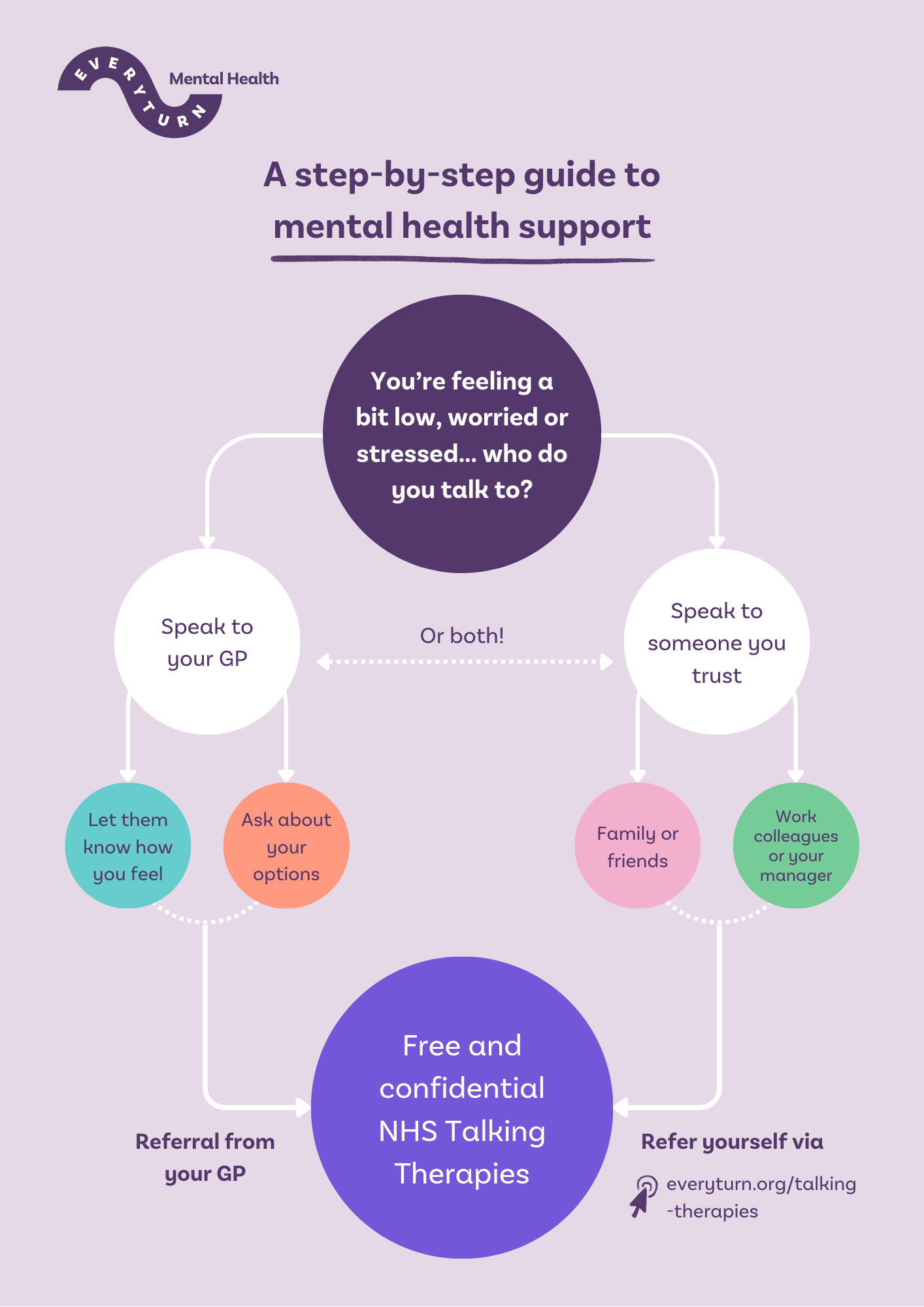
When we’re struggling with our mental health, we might feel like we should just ‘carry on’ or tell people that we’re ‘fine’ – even when we’re not. If we broke a leg, we wouldn’t let it heal on its own. If we lost our voice, we wouldn’t just carry on without speaking. We all have a right not to feel miserable. We wouldn’t neglect our physical health, so why should we neglect our mental health?
We know that it’s not always easy to talk about mental health, but it’s so important that we do. There are lots of reasons why we might feel the need to ignore how we’re feeling, and it’s important we recognise how those reasons can prevent us from getting help sooner.
Let’s take a look at some examples of why we might not ask for help:
Stigma
Despite mental health problems being really common (1 in 6 people aged 16+ in England) there are still a lot of harmful attitudes and perceptions surrounding mental health. This can also be known as ‘stigma’.
Stigma can come from many different places, such as society, the media, and even people we know. You might even believe it yourself, thinking the negative stereotypes are true about your own experiences.
If someone believes the negative stereotypes about themselves, it might stop them from being comfortable speaking to someone about how they’re feeling. This might mean that they will bottle up how they’re feeling which isn’t healthy. They may also fear what their friends and family might think.
Everyone has the right to good mental health support, and if we all do our part to tackle the stigma at every corner, we can make sure that nobody has to struggle alone.
Not knowing where to go for help
It can be daunting not knowing where to go and what to do when you feel you need mental health support. Sometimes, especially if we’re not feeling great, it can be overwhelming having to do all of the research yourself.
We’ve made a step-by-step guide for getting mental health support to make sure you feel confident about where you can go and what you can do. We hope this guide also shows how straightforward it can be to access mental health support.

Fear of the unknown and misconceptions
Similarly to the above, it can be daunting going into something you’re unfamiliar with, even more so when it comes to sharing things that feel personal to you. It doesn’t help that there are plenty of exaggerated (and inaccurate) portrayals of therapy sessions in the movies – laying on a sofa expressing your feelings to a therapist while they take notes in the background is not how a real-life therapy session looks!
Get an insight into some of the different therapies we provide here at Everyturn, in our It’s All Mental podcast where we chat to two of our brilliant therapists.
Listen to Monica talk about all things CBT (Cognitive Behavioral Therapy)
Listen to Julia talk about all things EMDR (Eye movement desensitization and reprocessing)
You can access NHS Talking Therapies for free across the UK, and this covers all kinds of support to help you feel better and manage better. Here is a quick overview of how this usually works:
Referral
First up is getting referred to NHS Talking Therapies, this can be done with your GP or by yourself via https://www.everyturn.org/talking-therapies/
Assessment
Next up is your assessment, which might sound scary, but is actually a 30-40 minute chat over the phone with a member of our friendly and compassionate team. In this conversation, you’ll answer some questions about how you’ve been feeling so that they can suggest the best form of support for you and your situation.
Waiting for your first appointment
After your assessment, you’ll be placed on the waiting list. Waiting times may vary for your first session, but there are always things you can do to help with your mental health in the meantime, take a look at our Advice Hub or visit the self help guide on the NHS website.
Your therapy sessions
There are different types of therapy available, so what your sessions look like will depend on the type of therapy you have. You can find an overview of the talking therapies we provide at Everyturn here.
Rest assured that no matter which type of therapy you have, your sessions will be with a friendly professional who will work together with you to help you improve how you’re feeling, and give you the tools to manage better in the future. There is no judgment, your therapy will be tailored to your specific situation and needs, and everything is confidential.
Denial
Sometimes when we’re not feeling good, it can be difficult for us to accept that we need help. This can sometimes tie in with the stigma that surrounds mental health, but other times it can be that we just don’t think our problems are ‘bad enough’. No matter how big or small your problems might be, there is no shame in asking for help. We understand how daunting it can be to take that step towards asking for support, and it’s an incredibly brave thing to do.
When we’re struggling with a physical health problem, we might be more likely to seek help sooner. Your mental health is just as important as your physical health, and you deserve to receive the right support as soon as possible.
Despite all these reasons, it’s so important that we all feel like we can ask for help. Don’t wait until you’re at your worst before you get the support you need. You have the right to confidentiality, to choose where you get support (Right to Choose), and to be taken as seriously as a physical problem would be.
We all have a right to not feel miserable, so don’t struggle on alone.



